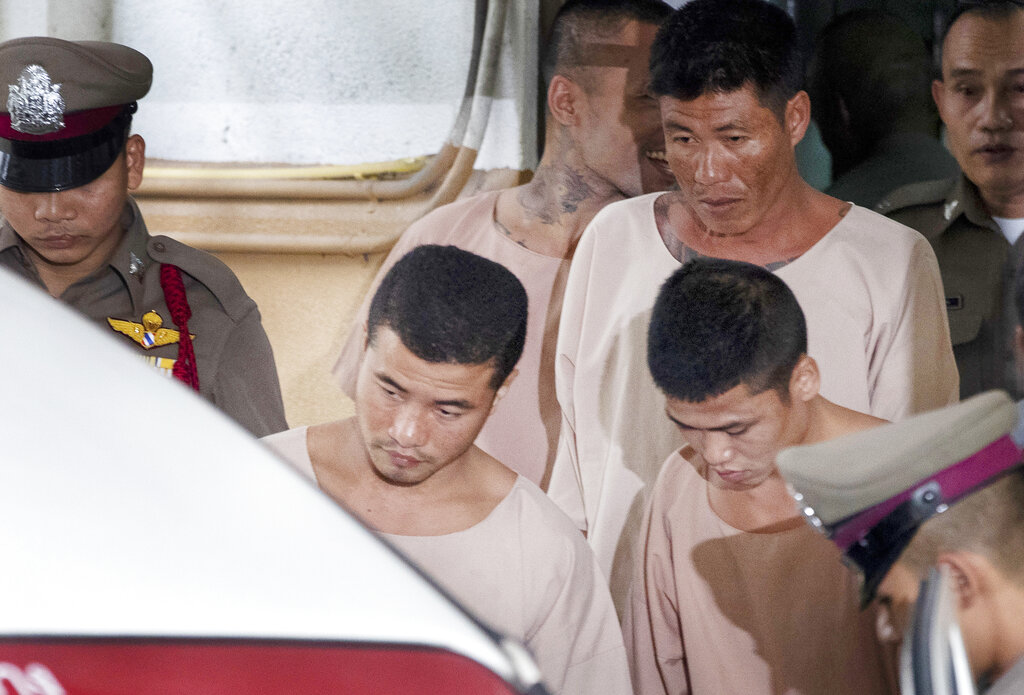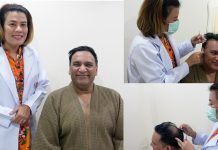
BANGKOK (AP) — Thailand’s Supreme Court on Thursday upheld the conviction of two Myanmar migrants sentenced to death for the murder of two British backpackers on a resort island in 2014.
Wai Phyo and Zaw Lin have denied killing David Miller and raping and killing Hannah Witheridge. Their battered bodies were found on the morning of Sept. 15, 2014, on a beach on the island of Koh Tao in the Gulf of Thailand.
Lawyers for the two convicted men had claimed the evidence in the case was mishandled and that they made confessions under duress that they later retracted, raising questions about police competence and the judicial system in Thailand.
The court dismissed allegations of physical mistreatment and mishandling of forensic evidence, saying the forensic work was handled by respectable institutions and it found no proof of torture.
Witheridge, 23, from Norfolk, and Miller, 24, from Jersey, had come to Thailand separately and met at the hotel where both were staying.
The two Myanmar men, both 22 at the time, were employed as service workers on the island, which is famous for its diving locations.
The Thai lawyer for the defendants contended they were provided with inadequate translators when talking to police, in addition to being physically abused into making confessions.
A well-known Thai forensics expert also testified at the trial that the DNA evidence that was a major element of the prosecution’s case did not link the defendants to the scene. The expert also alleged that police had failed to properly control the crime scene and mishandled the DNA evidence.
The court rejected the defense arguments and in December 2015 convicted both defendants of murder and sentenced them to death.
Human Rights Watch at the time called the verdict “profoundly disturbing,” citing the defendants’ accusations of police torture that were never investigated and questionable DNA evidence.
The killings and skepticism that Wai Phyo, also known as Win Zaw Htun, and Zaw Lin were the actual perpetrators cast a shadow on Koh Tao’s reputation. A series of deaths there of other foreign tourists — played up by British tabloids — continue to contribute to unease about the case.
The two defendants, dressed in light brown prison attire, were brought from a maximum security prison to the Nonthaburi provincial court, just north of Bangkok. Two judges took turns in reading the Supreme Court’s ruling.
An interpreter made available via video link translated the summary of the decision into Burmese, the language of the defendants. It took three hours to read the 69-page ruling. Both defendants were also found guilty of rape, along with illegally entering and residing in Thailand, and Wai Phyo was also convicted of stealing Miller’s phone and sunglasses.
After the decision was read, there was no visible reaction from the two, who looked on solemnly.
Defense lawyer Nadthasiri Bergman said after the court session that the two still maintain their innocence.
“They were very sad . and both of them said, through the translator, ‘I did not do this. I did not commit this crime,'” said Bergman, who added that having exhausted their appeals through the judicial system, they will appeal to Thailand’s king for a royal pardon, which has a chance of reducing the punishment from a death sentence to life imprisonment.
The death penalty is rarely carried out in Thailand, but in June last year, Thailand staged its first execution in nine years.
The Supreme Court’s ruling summed up the case against the defendants, asserting that not only did one of the DNA samples taken from the victim match the suspects, but also that “Confessions made by the suspects while they were considered witnesses, together with other evidence from the crime scene and circumstantial evidence, as well as one of the suspects’ own admission of stealing the victim’s mobile phone — all lead to the conclusion that the suspects are the perpetrators.”
It dismissed the allegations that the two Myanmar men were physically abused to force confessions from them, saying that an injury on one of them occurred only after their confessions and the cause was not clear.
Andy Hall, a migrant workers’ activist who served as an adviser to the defendants’ legal team, said the Supreme Court ruling was “not a decision consistent with accepted criminal burden of proof requirements needed to be satisfied to impose such a conviction.”
“DNA and forensics evidence relied upon to convict Zaw Law and Wai Phyo and sentence them to death in the Koh Tao murder case was in my opinion fundamentally flawed and should always have been considered unreliable when considered against international standards on DNA and forensics usage in criminal trials,” Hall said in an email.




